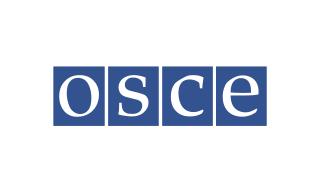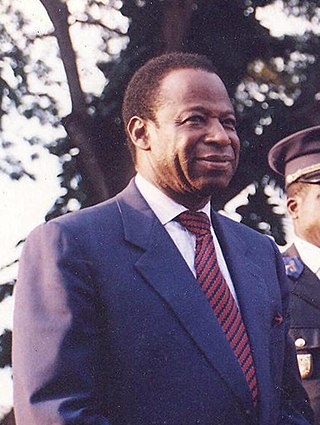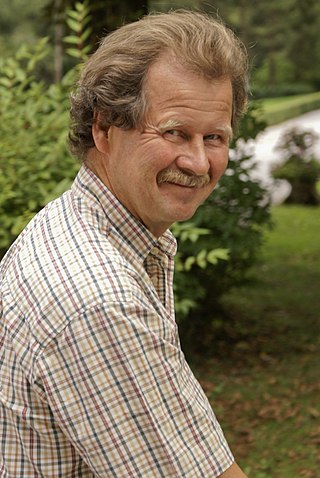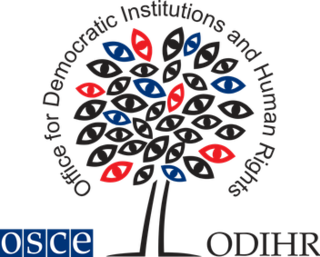Related Research Articles

The Council of Europe is an international organisation with the goal of upholding human rights, democracy and the rule of law in Europe. Founded in 1949, it is Europe's oldest intergovernmental organisation, representing 46 member states from Europe, with a population of approximately 675 million as of 2023; it operates with an annual budget of approximately 500 million euros.

The Organization for Security and Co-operation in Europe (OSCE) is a regional security-oriented intergovernmental organization comprising member states in Europe, North America, and Asia. Its mandate includes issues such as arms control, the promotion of human rights, freedom of the press, and free and fair elections. It employs around 3,460 people, mostly in its field operations but also in its secretariat in Vienna, Austria, and its institutions. It has observer status at the United Nations.

The United Nations Human Rights Council (UNHRC) is a United Nations body whose mission is to promote and protect human rights around the world. The Council has 47 members elected for staggered three-year terms on a regional group basis. The headquarters of the Council are at the United Nations Office at Geneva in Switzerland.

Amara Essy is a diplomat from Ivory Coast.

Election monitoring involves the observation of an election by one or more independent parties, typically from another country or from a non-governmental organization (NGO). The monitoring parties aim primarily to assess the conduct of an election process on the basis of national legislation and of international election standards. There are national and international election observers.

Manfred Nowak is an Austrian human rights expert, who served as the United Nations Special Rapporteur on Torture from 2004 to 2010. He is Secretary General of the Global Campus of Human Rights in Venice, Italy, Professor of International Human Rights, and Scientific Director of the Vienna Master of Arts in Applied Human Rights at the University of Applied Arts in Vienna. He is also co-founder and former Director of the Ludwig Boltzmann Institute of Human Rights and a former judge at the Human Rights Chamber for Bosnia and Herzegovina. In 2016, he was appointed Independent Expert leading the United Nations Global Study on Children Deprived of Liberty.

Presidential elections were held in Kazakhstan on 10 January 1999. Incumbent president Nursultan Nazarbayev won the election with over 80% of the vote, and was sworn into office on 20 January 1999. Most observers viewed the election as blatantly unfair, further confirming that Nazarbayev was not interested in promoting a democratic system of government. Voter turnout was reported to be 87%.
The Fighting Discrimination Program of Human Rights First focuses on the violence known as hate crimes or bias crimes. Because equality is a cornerstone of human rights protection, discrimination in all its forms is a violation of human rights. Discrimination can take the form of violence generated by prejudice and hatred founded upon a person's race, ethnicity, religious belief, sexual orientation, gender, disability, age or other such factors. Through the Fighting Discrimination Program, Human Rights First seeks to combat discrimination by reversing the tide of antisemitic, anti-immigrant, and anti-Muslim violence and reducing other bias crime in North America, Europe, and the Russian Federation.

The Office for Democratic Institutions and Human Rights (ODIHR) is the principal institution of the Organization for Security and Cooperation in Europe (OSCE) dealing with the "human dimension" of security. The Office, originally established in 1991 under the 1990 Paris Charter as the Office for Free Elections, is still best known for its role in observing elections although its name changed in 1992 to reflect the broadening of its role by the Helsinki Summit.

Janez Lenarčič is a Slovenian diplomat who has been serving as European Commissioner for Crisis Management in the First von der Leyen Commission 2019–2024. He is a former director of the Office for Democratic Institutions and Human Rights within the Organization for Security and Co-operation in Europe.

John James Maresca is an Italian-American diplomat, business leader, and educator. Maresca has held a number of posts in the US government including deputy assistant secretary of defense and US ambassador. He has also founded, led, and contributed to a number of prominent NGOs and private sector companies. He served as rector of the United Nations-mandated University for Peace (UPEACE) in Costa Rica until February 2013.

Eoghan Murphy is an Irish former Fine Gael politician, who served as a Teachta Dála (TD) from 2011 to 2021, representing the Dublin Bay South constituency. He served as Minister for Housing, Planning and Local Government from 2017 to 2020 and as Minister of State for Financial Services from 2016 to 2017. In 2021, he served as Head of Mission on election observation missions to Armenia, Uzbekistan, Italy and Kazakhstan on behalf of the Organisation for Security and Cooperation (OSCE).

Presidential elections were held in Azerbaijan on 9 October 2013. The result was a victory for incumbent President Ilham Aliyev, who received a reported 85% of the vote, whilst leading opposition candidate Jamil Hasanli finished second with a reported 6% of the vote.

Salvatore Martinez (Enna, May 4, 1966) is an Italian scholar, the first layperson president of the Rinnovamento nello Spirito Santo (Parte de Catholic Charismatic Renewal) in Italy. President of the Vatican Foundation "International Center Family of Nazareth" and personal representative of the Organization for Security and Co-operation in Europe (OSCE)Chairperson-in-Office 2018 on Combating Racism, Xenophobia, and Discrimination, also focusing on Intolerance and Discrimination against Christians and Members of other Religions.

Michael Georg Link is a German politician of the Free Democratic Party (FDP) who has served a member of the Bundestag from 2005 to 2013 and again since 2017.
The European Network of National Human Rights Institutions (ENNHRI) is a membership international not-for-profit association (AISBL) under Belgian law. In 2013 it established its Permanent Secretariat in Brussels bringing together National Human Rights Institutions (NHRIs) from across the wider European region. Formerly known as European Group of National Human Rights Institutions, ENNHRI has been actively working in the field of promotion and protection of human rights in wider Europe for 15 years. ENNHRI essentially assists in the establishment and accreditation of European NHRIs, coordinates the exchange of information and best practices among its members, facilitates capacity building and training, engages with international and regional mechanisms for protection and promotion of human right and intervenes on legal and policy developments in Europe.

Thomas Greminger is a Swiss diplomat. He served as Secretary-General for the Organization for Security and Co-operation in Europe (OSCE) from July 2017 to July 2020. Since May 2021, he has been the Director of the Geneva Centre for Security Policy (GCSP). He is a general staff officer in the Swiss army.

Leena Al-Hadid is a Jordanian diplomat, ambassador extraordinary and plenipotentiary to Austria, the Czech Republic, Slovakia, Hungary, and Slovenia. She also serves as Jordan's permanent representative to the Organization for Security and Co-operation in Europe and the United Nations in Vienna. In 2018–2019, she was the elected chairperson of the International Atomic Energy Agency's board of governors.

Matteo Mecacci is an Italian diplomat. From December 2020 to August 2024 served as director of the OSCE's Office for Democratic Institutions and Human Rights (ODHIR). In the past, he was a Radical Party Member of Parliament in Italy and elected in the lists of the Democratic Party, President of the International Campaign for Tibet and leading advocate for the International Criminal Court, the abolition of the death penalty, religious freedom and other prominent human rights campaigns.
The Permanent Representative of Austria to the United Nations is the official representative of the government of Austria to the United Nations.
References
- ↑ "European Group Cancels Mission to Observe Russian Election, Citing Restrictions". The New York Times. New York. February 2008. Archived from the original on 2019-01-31. Retrieved 31 January 2019.
- ↑ "Christian Strohal, Director of the OSCE Office for Democratic Institutions and Human Rights". OSCE. 2003. Retrieved 21 February 2016.
- ↑ "Ambassador Christian Strohal". OSCE. Retrieved 21 February 2016.
- ↑ such as 2008's Democratic Elections and their Monitoring: Can this OSCE Success Story Be Sustained?
- ↑ "Christian Strohal". Austria: NWV Verlag. Archived from the original on 21 February 2016. Retrieved 21 February 2016.
